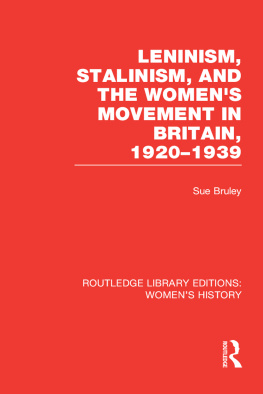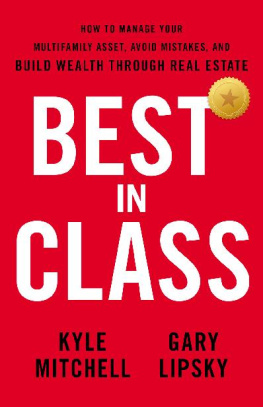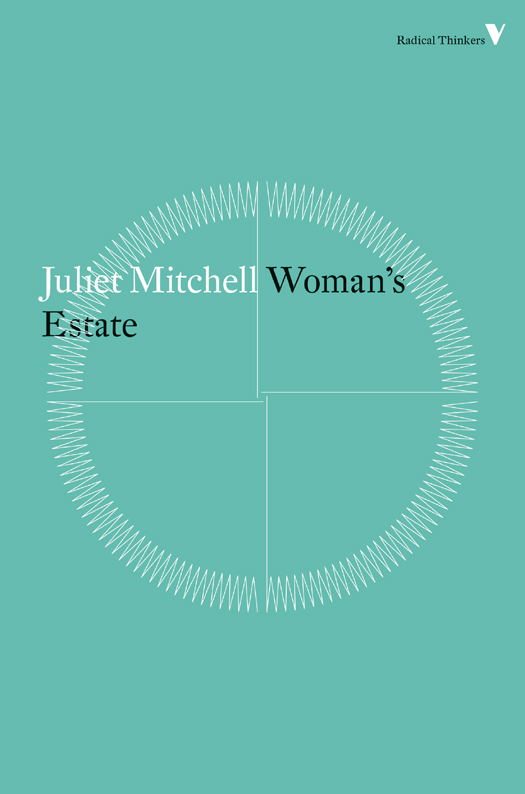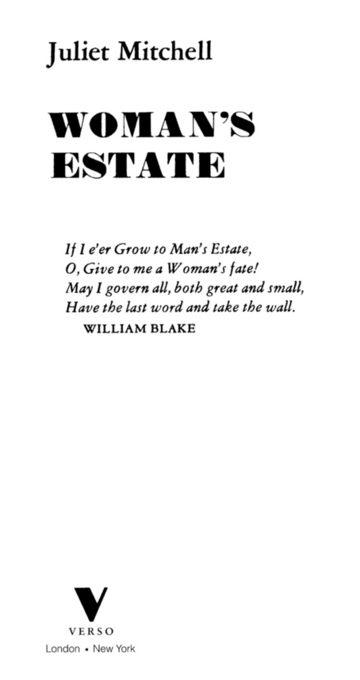First published by Verso 2015
First published by Pantheon Books 1971
Juliet Mitchell 1971, 2015
All rights reserved
The moral rights of the author have been asserted
Verso
UK: 6 Meard Street, London W1F 0EG
US: 20 Jay Street, Suite 1010, Brooklyn, NY 11201
www.versobooks.com
Verso is the imprint of New Left Books
ISBN-13: 978-1-78168-762-8
eISBN-13: 978-1-78168-763-5 (US)
eISBN-13: 978-1-78168-764-2 (UK)
British Library Cataloguing in Publication Data
A catalogue record for this book is available from the British Library
Library of Congress Cataloging-in-Publication Data
A catalog record for this book is available from the Library of Congress
v3.1
For Otti
Contents
Acknowledgements
My thanks are due, above all, to the Womens Liberation Movement for what it will do for all women in the future, and for what it has already done for so many of us.
I also wish to thank the New Left Review for permission to reprint (in somewhat altered form) an article I wrote in 1966: Women: The Longest Revolution (N L R no. 40); Modern Occasions for an extract from my review of Kate Millets Sexual Politics (The Sexual Revolution, Modern Occasions, Winter 1970); Shrew (the magazine of the London Womens Liberation Workshop) for the use of Margaret Walters article on Holland and for an extract from my own article Why Freud? (Shrew, NovemberDecember 1970).
I thank, too, Andr Schiffrin for the suggestion, Florence Hobson for the typing and Marjorie, Eric, Daphne, Margaret, Anna and Jim.
Preface
By 1970 there was some form of Womens Liberation Movement active in all but three of the liberal democratic countries of the advanced capitalist world. It distinguishes it also from its current media presentation as an Anglo-Saxon, predominantly American movement. In England, this insular presentation serves the function of assimilating it to the popular conception of earlier feminism and thus contributes to diffusing its impact: women went wild before, so they are again. Its only a flash-in-the-pan!
Most of the different groups are professedly, if variously, revolutionary. Why are they rarely seen to be such?
Every day in the press or on television in the United States and increasingly in England, there are comments on the movement, or statements from its spokeswomen. As women claim that they want to change the whole structure of society, that they see the system as oppressive and to be combatted at every level, interviewers smile benignly (or scoffingly), clearly envisaging that a change in the system might mean a bit more washing-up or child-minding for the husband. It is true that currently it is a fashionable movement, and that laughter takes the sting out of the attack, and that if verbal aggression escalates into acts of violence then, as it did with the suffragettes, the states repressive and coercive forces will come into play. Already, it is claimed that in America militant women are losing or not obtaining jobs. There is no reason why violence and counter-violence should not reach the peaks achieved in the first decades of this century in England. Then the suffragettes burnt down houses, smashed shop windows, assaulted Members of Parliament, planted bombs, destroyed over a hundred buildings in a matter of months and disrupted communications by blowing up letter-boxes and cutting telegraph wires. They generally scarred the countryside of England with their demand for the vote. In turn, they were imprisoned, forcibly fed and beaten up. A special Act of Parliament the Cat-and-Mouse Act enabled their continual reimprisonment. But while this went on, the headquarters of the most militant group the Womens Social and Political Union (the W S P U) with campaign funds of 90,000, one hundred and ten paid staff, a subscribing membership of one thousand and a newspaper circulation of 40,000, remained untouched. True, conspiracy charges were brought against some of the leaders and Christabel Pankhurst was forced into exile, but neither this nor any other organization as such was ever smashed. It is sometimes necessary to shut women up, but their political organizations are never to be taken too seriously.
Today, something comparable seems to be happening. The assimilation of Womens Liberation by the media into colourful reportage may be symptomatic of something more than its hungry lust for sexual objects in any shape they come. As individuals, many men react to womens claims with fear or, alternatively, with bemused, compensatory tolerance. But there is no indication that as yet, despite its enormous growth, the organized movement can claim more than nuisance value. All previous revolutionary movements have had, at their centre, at the crucial times, to be clandestine. It is not just that the media gives Womens Liberation publicity, it is that, in concept and organization, it is the most public revolutionary movement ever to have existed. Able, too, to make the most revolutionary statements in public without anyone seeming bothered. This raises many questions, not only about a society which sees women as always unserious, but perhaps, more critically for the immediate future, about the nature of the movement itself.
We have to ask why it arose (the conditions that timed its birth in the late sixties). What it is like as a political movement. What problems does it have to confront in analysing the position of women. And where do we go from here?
In discussing the historical time at which it arose we have to consider contemporary radical or revolutionary movements with which it is in alliance or from which it broke: the student movement, Black Power, draft resistance, already existent sectarian groups and reformist womens groups, Third World struggles. We have to consider the specific condition of women during the decade that produced the revolt.
A description of the characteristics of the movement involves its size, class-nature and the activity of its participants, its organization, the campaigns it wages and the concepts it is evolving in the process of building itself as a political movement: consciousness-raising, male chauvinism, sexism, feminism, liberationism and its no-leadership structures. Also the revolutionary or radical tradition it draws on: the politics of experience,
We have also to discuss the specific features of womans situation that most clearly locate her oppression. Quite simply, how do we analyse the position of women? What is the womans concrete situation in contemporary capitalist society? What is the universal or general area which defines her oppression? The family and the psychology of femininity are clearly crucial here. However inegalitarian her situation at work (and it is invariably so) it is within the development of her feminine psyche and her ideological and socio-economic role as mother and housekeeper that woman finds the oppression that is hers alone. As this defines her, so any movement for her liberation must analyse and change this position.
Where are we going? Quite simply, is the movement which claims to be revolutionary in intention moving towards the formation of itself as a revolutionary organization? What would this mean in terms of its internal structure and external alliances? Is the feminist concept of women as the most fundamentally oppressed people and hence potentially the most revolutionary to be counterposed to the Marxist position of the working class as







